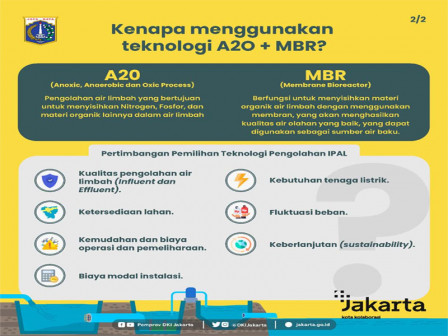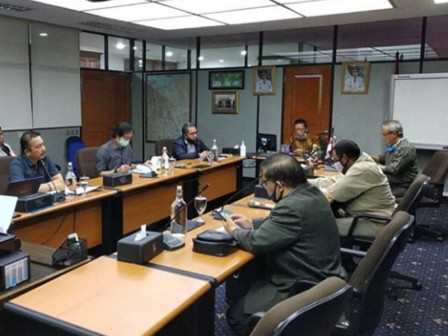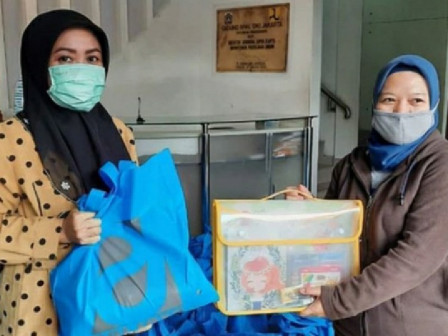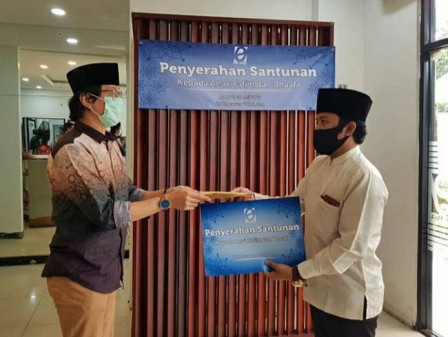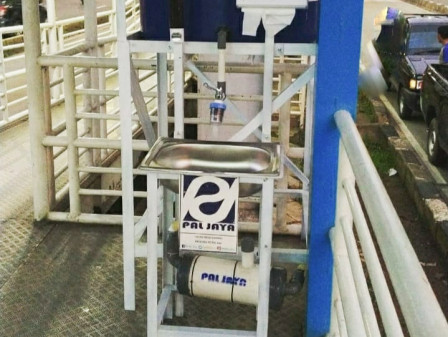City Prepares Centralized Domestic Wastewater Management System
Reported by Rezki Apriliya Iskandar | Translated by Nugroho Adibrata
Water will be polluted if population growth and economic development in Jakarta are not supported by improvements to the domestic wastewater disposal system
Jakarta Water Resources (SDA) Agency is preparing a Centralized Domestic Wastewater Management System (SPALD-T) for urban and residential scale in Jakarta, which consists of wastewater treatment plant (IPAL) and Piping Network.
Juaini Yusuf, Head of Jakarta Water Resources Agency said the IPA could be used to increase access to wastewater services, improve environmental quality in surface water and ground water and become an alternative source of raw water as a source of clean water in the community.
PD PAL Jaya Continues to Add More Portable Sinks"Water will be polluted if population growth and economic development in Jakarta are not supported by improvements to the domestic wastewater disposal system. Even, the improvement and development of a centralized wastewater management system can improve health and environmental quality. IPAL can also prevent waterborne disease caused by poor surface and groundwater quality," he expressed, as quoted by Jakarta PPID's press release, Friday (9/25).
He went on to say that the SPALD-T was capable of managing domestic wastewater in an urban/regional scope with a minimum service of 20,000 people. As for the coverage of communal SPALD-T services at settlement scale could manage domestic wastewater to serve 500 to 6,000 people for each SPALD-T built settlement. There was also a certain area scale that includes commercial areas and apartment areas.
It was compliance with PUPR Ministry Regulation number 4/2017 on the Domestic Wastewater Management System as a guideline for SPALD administrators to provide domestic wastewater management services to the entire community.
"We are also working with PD PAL Jaya to improve sanitation by treating domestic wastewater from the local system through the revitalization of the septic tank. The SPALD construction at the local system settlement scale will also continue to be carried out, especially in residential areas which are deemed to require proper sanitation access," he explained.
Starting from the initial processing which functioned to remove large particles such as sand, wood, plastic, etc. Then through a primary processing process which generally used physical processing followed by a secondary processing stage, which generally used a biological treatment system that aims to decompose organic matter in waste water, which was a source of pollutants, including an activated sludge system, Membrane Bioreactor (MBR), Biofilter, etc.
In the final stage, a disinfection process was executed to eliminate pathogenic organisms (which are harmful to health) and from this final result it was expected that the domestic wastewater quality standards had been established. If needed, further processing could be carried out to achieve better processed water for recycle.
As for the information, the time required for WWTP to carry out the biological treatment process is carried out continuously for 24 hours per day. To process wastewater, it takes a certain time from the start to the end. The estimated processing time is adjusted to the type of technology used and the target of its processing, for instance A2O technology (Anoxic, Anaerobic and Oxic Process), namely wastewater treatment, which aims to remove Nitrogen, Phosphorus and other organic matter in wastewater and MBR (Membrane Bioreactor) technology, which functions to remove organic matter from wastewater by using membrane technology which can produce good quality processed water and can be used as a source of raw water.
The total urban scale SPALD-T Development Zones planned through the Jakarta Sewerage System development program are 15 Zones with Zone 0 as the existing Zone (Setiabudi Reservoir) and 5 priority Zones (Zones 1, 2, 5, 6 and 8).
Here is a list of planned IPAL locations for 14 zones, the area of WWTP and their processing capacity:
1. Pluit Reservoir, with 240,000 m3/day capacity as wide as 3.9 ha
2. Muara Angke Rerservoir, with 21,000 m3/day capacity as wide as 0.8 ha
3. Srengseng Urban Forest, with 103,680 m3/day capacity as wide as 4 ha
4. Pulo Gebang IPLT, with 300,000 m3/day capacity as wide as 8.7 ha
5. Sunter Utara Reservoir, with 129,600 m3/day capacity as wide as 4.6 ha
6. Duri Kosambi IPLT, with 282,000 m3/day capacity as wide as 6 ha
7. Kamal Pegadungan Reservoir Plan, with 69,120 m3/day capacity as wide as 3.9 ha
8. Marunda Reservoir Plan, with 160,000 m3/day capacity as wide as 6 ha
9. Rawa Rorotan Reservoir Plan, with 85,996 m3/day capacity as wide as 2.9 ha
10. Pulo Gebang IPLT, with 300,000 m3/day capacity as wide as 8.7 ha
11. Ulujami Reservoir Plan, with 252,572 m3/day capacity as wide as 5.9 ha
12. Ragunan Zoo, with 88,862 m3/day capacity as wide as 3.1 ha
13. Kampung Dukuh Reservoir Plan, with 168,596 m3/day capacity as wide as 5.7 ha
14. RW 05 Reservoir Plan, Ceger, with 98,763 m3/day capacity as wide as 3.6 ha

